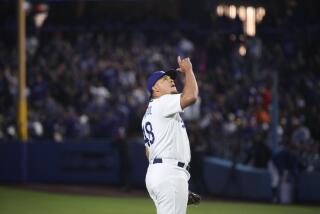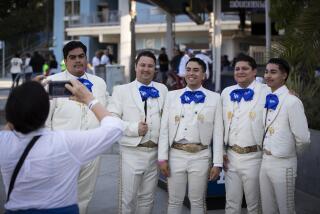Baseball, Music Bridge U.S.-Cuba Gap
- Share via
HAVANA — The churches and streets here were filled soon after dawn Sunday with worshipers marking the start of the Christian Holy Week--once a forbidden scene in Communist-run Havana.
But on Palm Sunday afternoon, all eyes were focused on baseball: About 50,000 party loyalists and friends, led by President Fidel Castro himself, packed the downtown Latin American Stadium for an exhibition game pitting the Cuban national team against the Baltimore Orioles.
The crowd cheered for Cuba but applauded the Orioles as well, as millions more spectators sat riveted to TV sets in two nations separated by 90 miles of water and 40 years of official enmity.
Even Castro, clad in trademark military fatigues, stood up from his seat behind home plate for “The Star-Spangled Banner.”
And when night fell, the town rocked: Jimmy Buffett, Bonnie Raitt and Gladys Knight took the stage in a concert by local and American musical stars that ended an extraordinary day in Cuba. Their opening number in the Karl Marx Theater: a stylized Cuban rendition of “Bridge Over Troubled Water.”
All this in a single day--a remarkable convergence of American cultural icons with their Cuban counterparts at a time when relations between the governments in Havana and Washington are approaching one of their lowest points since the end of the Cold War.
The timing of the game and the concert was coincidental. But their aim was the same: a fitful, often symbolic grass-roots opening between America and one of its last Cold War opponents, which began in earnest after Pope John Paul II’s January 1998 call here for Cuba to open to the world and for the world to open to Cuba.
“It’s facetious to say we’re just here playing baseball and making music,” Buffett said in an interview behind the Cuban dugout in the seventh inning of Sunday’s game, a hard-fought contest Cuba lost, 3-2, that marked the first time a U.S. major league team had played in Cuba since the Dodgers took the field here 40 years ago last week.
Buffett, a baseball fan among a group of 100 American musicians who had spent the past week here co-composing new songs with Cuban artists, added: “It’s an interesting process that’s going on. Where it all leads, no one knows. It’s like they say in ‘Shakespeare in Love’: It’s a mystery.”
The Clinton administration has dubbed this process “people-to-people exchange,” part of what it called a relaxation in January of the punishing economic embargo the U.S. clamped on Cuba soon after Castro came to power.
But the expanded cultural exchanges have triggered strong counterpoints in this island nation to Sunday’s festivities.
They have outraged Cuban Americans who fled the island through the decades. Some staged street protests in South Florida in advance of Sunday’s game between a select group of Cuban stars and the Baltimore team, and one Miami-based Oriole pitcher pulled out of the trip out of concern for his family, Baltimore Manager Ray Miller confirmed Sunday.
The administration’s Jan. 5 measures also infuriated Cuba’s strident socialist government, which officially has labeled the U.S. embargo “economic warfare” and has used it to help justify before international human rights bodies its recent crackdown on internal political dissent.
One Cuban official likened the measures to throwing crumbs to a starving man. Other officials here view them as a subtle attempt to destabilize the Castro regime by influencing, corrupting and ultimately undermining its socialist values. And several analysts and diplomats in Cuba interpreted the recent trial of four political dissidents, who were convicted and jailed for crimes against the state, as a clear signal to all Cubans that collaborating with the enemy in some areas remains illegal.
In the weeks leading up to Sunday’s extraordinary juxtaposition of events, both governments sought to downplay the day’s importance.
Neither the musical collaboration, dubbed “Music Bridges,” nor the Cuba-versus-Baltimore game was mentioned in Cuba’s state-run media until Friday. Even then, it merited just a few paragraphs in the Communist Party’s newspaper, Granma, the country’s only daily.
In contrast, on the eve of the game and concert, the paper’s Saturday edition devoted more than a page to Cuba’s position that the U.S. and NATO attacks on Yugoslavia are “repugnant,” “brutal,” “genocide” and “a barbaric aggression”--part of “a horrible unipolar hell that NATO and the United States are trying to impose on the rest of the world.”
But for the participants and promoters of Sunday’s events--and mostly for the average Cubans who basked in the spectacles--the day was, at the very least, an island of personal warmth, sharing, mutual respect and joy in a Cold War-era confrontation that refuses to thaw.
Nowhere was that more evident than in Latin American Stadium, where tens of thousands of Cubans gave Orioles slugger Albert Belle a standing ovation just for his batting-practice performance; where Castro sat through an entire 3 1/2-hour, 11-inning game flanked by U.S. Baseball Commissioner Bud Selig and Orioles owner Peter Angelos; and where fan Tania Mancebo painted a Cuban flag on the left side of her face, an American flag on the right and a peace symbol in the center of her forehead.
“It’s a game of friendship,” she said, explaining her facial adornment. “It’s not important who wins. It’s important to be friends.”
Clearly, in baseball-crazed Cuba, which is in the midst of its own national championship series, the ballgame was the day’s featured event--a vivid display of a shared national bond suddenly emerging from a deep freeze.
The game climaxed more than three years of negotiations with Washington and Havana by Orioles owner Angelos, which he told reporters here earlier this year was a private effort “with the intention of bringing the Cuban people and our citizens in the United States closer together.”
On Sunday, even Buffett conceded: “I think the ballgame will have more of an effect than the songwriting in the long run. Baseball is just such a part of the culture here.”
Veteran stadium groundskeeper Vicente Romero, 71, who rattled off half a dozen American major and minor league teams he watched here before the revolution, said the goodwill game was most important for young Cubans.
“They know good baseball when they see it, and they’re seeing it today,” Romero said.
Added one of those Cuban young people, Nelson Rudy, a 28-year-old cigar roller at the government’s Cohiba factory who caught a baseball an Oriole had tossed into the bleachers: “This is a historic moment for us Cubans, and for me personally.
“I’m seeing a professional baseball team, live, for the first time in my life. I’m seeing that our people--Cubans and Americans--have no problems with each other. And now I have this ball to remind me.”
Juan Manuel Garcia, 22, also had a souvenir. He caught the two-run rocket-shot home run that Orioles catcher Charles Johnson hit into the left-field bleachers to lead his team to victory.
“I just caught the first professional home run hit here in 40 years,” said Garcia, a bus driver from nearby Pinar del Rio. “This is the first. But everything starts with the first one.”
Garcia, a government employee, was like most in the largely subdued crowd--members of official organizations who were selected to attend the invitation-only game in a stadium where admission normally is open to anyone and costs just 10 cents. Although Sunday’s ticket policy caused some grumbling among die-hard fans who work in Cuba’s nascent private sector, most watched the game at home as it was broadcast live on state television and said it was heartening simply that the Orioles were in Havana.
The scene inside the stadium stood in stark contrast to the Cuban national semifinal series that had preceded it: The latter had no cheerleaders, no alcohol and far less noise. And outside, the streets of a city usually teeming with Sunday life were empty, as families and friends crammed into living rooms to view the game.
Despite the loss, there were no tears when the game ended. Commenting on the final score of a contest that most Cubans saw as more than just a game, many in the streets expressed respect and admiration for both teams. And most noted that there will be a rematch between the two teams at Baltimore’s Camden Yards on May 3.
“The main thing is, this was a great show,” Cuban team manager Alfonso Urquiola said at a postgame news conference.
Miguel de Armas, a bartender who could not attend the game, had a slightly different assessment. Beaming and shaking an American’s hand, he said: “We lost. But we lost well. We lost with our boots on.”
* JAMMING IN HAVANA
Cubans, Americans sing together in capital for first time in 40 years. A9
More to Read
Sign up for Essential California
The most important California stories and recommendations in your inbox every morning.
You may occasionally receive promotional content from the Los Angeles Times.













